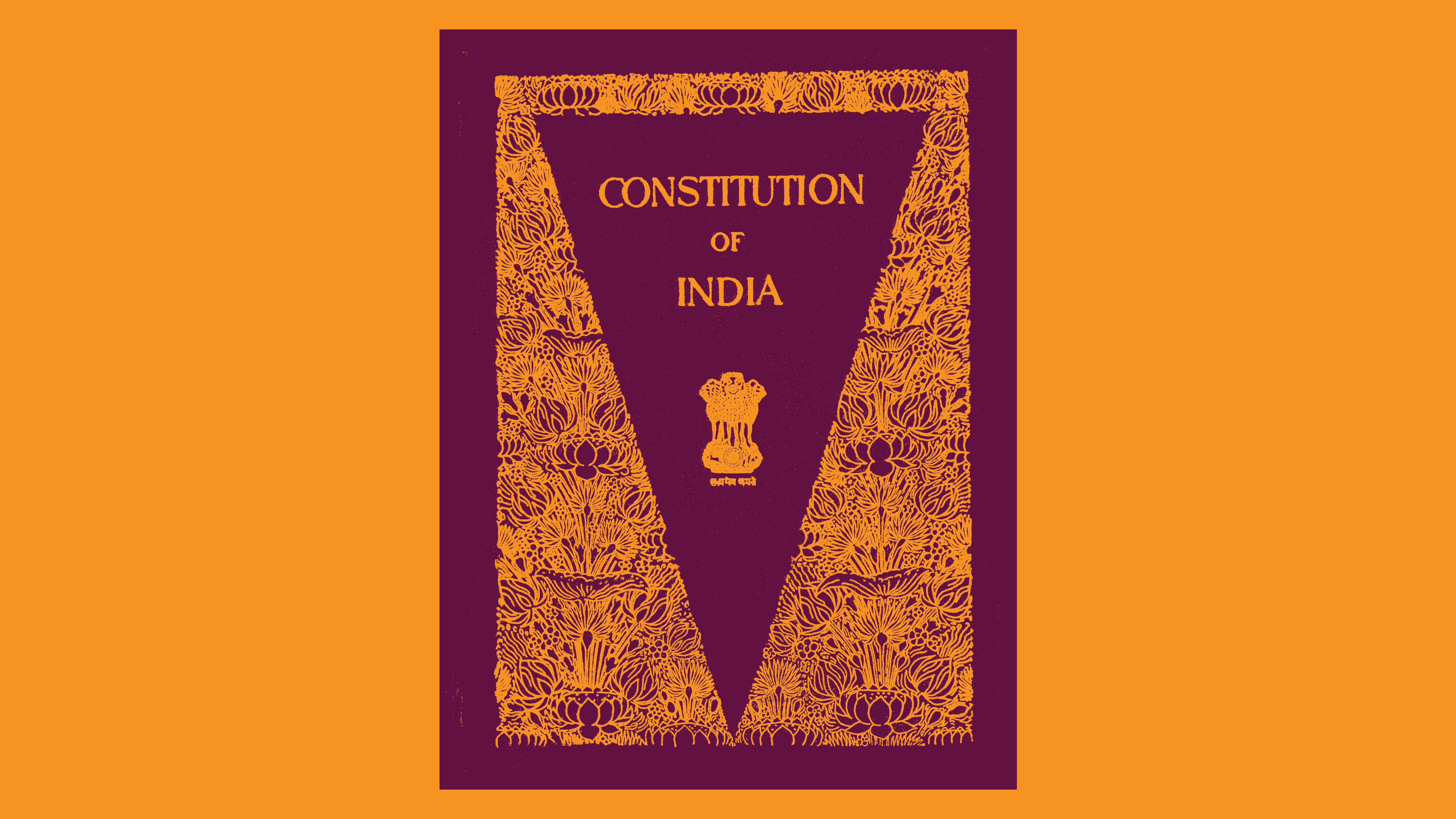Vasishtha Kavyakantha Ganapati Muni was a seer who dedicated his life to revive and renew ancient Indian wisdom. Sāmrājyanibandhanam is a Sanskrit text composed by the Muni and proposed as the constitution for India.
By Vinay HA, Research Associate at Rashtram
Vasishtha Kavyakantha Ganapati Muni was a tapasvi and a seer who dedicated his life to revive and renew ancient Indian wisdom. He composed numerous works of different genres such as stotras, Kavyas and commentaries on a wide range of subjects. He was conferred the title “Kavyakantha” by an assembly of Sanskrit scholars who were stunned by his eloquence. Interested readers can find a detailed account of Ganapati Muni here: Vasishtha Ganapati Muni- An Introduction to his life and works
On the occasion of the Republic day, we attempt to provide a glimpse into Sāmrājyanibandhanam, a Sanskrit text composed by the Muni and proposed as the constitution for India. It consists of 560 sūtras spread across 122 adhikaranas and 20 adhyāyas.
As the text is in the sūtra style, many questions that may arise about the significance and implications of the text can only be addressed by a full-fledged commentary. However, this blog merely intends to provide a brief introduction to the text.
Sāmrājya Nibandhanam
अथातः साम्राज्यनिबन्धनम् ॥ 1,1.1 ॥
Now therefore Sāmrājyanibandhanam.
प्रभुत्वबन्धकं तत्कृत्याधिकारनियामकं प्रजाधिकारमर्यादाविधायकं साङ्घिकधर्ममर्यादोपदेशकं च शास्त्रं साम्राज्यनिबन्धनम् ॥ 1,1.2 ॥
The above sūtra defines Sāmrājyanibandhanam as the śāstra which
- Establishes prabhutva (sovereignty).
- Enjoins the adhikāra (rights) of the prabhutva.
- Lays down the adhikāra (rights) and maryāda (bounds of morality) of the praja (subjects).
- Instructs the Dharma and maryāda to be upheld by the community.
नरिष्टा मन्त्रिमण्डली राजकुलं सम्राट् चेति चतुष्पात् परिपालकव्यूहः प्रभुत्वम् ॥ 1,2.5 ॥
The Prabhutva is defined as the arrangement or the institution which is responsible for the all-round protection (of the Sāmrajya). It consists of four limbs:
नरिष्टा – अर्हप्रजावर्गाणाम् अर्हप्रतिनिधिभिः बद्धा सभा (1,2.6)
An assembly of representatives elected from an eligible group of the prajā.
मन्त्रिमण्डली – नरिष्टात उत्पादित कार्यनिर्वाहकवर्गः (1,2.7).
A smaller executive group created out of the nariṣta.
राजकुलं – न्यायनिर्वहणेऽन्त्यं निर्णयं दातुं प्रभवित्री सम्राट्पुरःसरा प्राड़्विवाक सभा राजकुलम् (1,2.8).
An assembly of jurists authorised to take the final decision regarding legal matters, led by the Saamraat.
सम्राट् – साम्राज्यस्य वंशपरम्पराधिकारवानीश्वरः सम्राट् (1,2.9).
Samrāt is the ruler of the Sāmrajya who inherits the position from his lineage.
साम्राज्यम्
In 1,4.14-18, the text defines Sāmrajya and its constituents. राष्ट्रकूटं साम्राज्यमुच्यते, that is, Sāmrajya is a congregation or union of Rāṣtras. The Rāṣtras are of two kinds: Mahāsaṃsthānas and Prāntas. While the Mahāsaṃsthānas are provinces passed on to the rulers through inheritance (वंशपरम्पराऽधिकारवत्पालकं राष्ट्रं महासंस्थानम्), the Prāntas are provinces assigned to the respective rulers by the Samrāt (सम्राडधिकृतपालकं प्रान्तः). The text also lists out further geographical divisions of the Sāmrajya based on demography which is not being discussed here.
The king has four secretaries to oversee works of different departments:
शासनिकसन्धिविग्रहेष्वमात्यो नामतः ॥ 10,61.8 ॥
Amātya for assisting in the matters of administration and diplomacy.
न्यायनिर्वहणे न्यायशास्त्री ॥ 10,61.9 ॥
Nyāyashāstri for assisting in legal matters
साङ्ग्रामिके सेनापतिः ॥ 10,61.10 ॥
Senāpati in matters related to war.
अन्तरङ्गकृत्येष्वहिभयपरिषोधने च सचिवः ॥ 10,61.11 ॥
Saciva for internal affairs and security.
सप्तमहामर्यादाः
At the very end of the text, we get the Sapta Mahā Maryāda or the seven great bounds of morality (20, 122.7-13):
- न हन्न्यान्नरम्
Do not kill humans
- न परस्य धनं हरेत्
Do not covet other’s wealth
- न परदारान् गच्छेत्
Do not approach other’s wife
- न सुरां पिबेत्
Do not drink liquor
- नानृतं ब्रुयात्
Do not speak false
- न परं दूषयेत्
Do not harm/taint
- न परस्य द्रोहमभिदध्यात्
Do not cheat others.
ता एताः सप्तमहामर्यादाः सप्तमहामर्यादाः ॥ 20, 122.14 ॥
These are the seven great bounds of morality.
References
- https://sampadanandamishra.medium.com/vasishtha-ganapati-muni-an-introduction-to-his-life-and-works-a172bba7b545
- https://kavyakantha.arunachala.org/KNatesan.htm
- Saamrajyanibandhanam (Saamrajyanibandhanam and other works of Kavyakantha Ganapati Muni can be accessed from: https://www.sriramanamaharshi.org/resource_centre/publications/collected-works-vasishtha-kavyakantha-ganapati-muni/)

